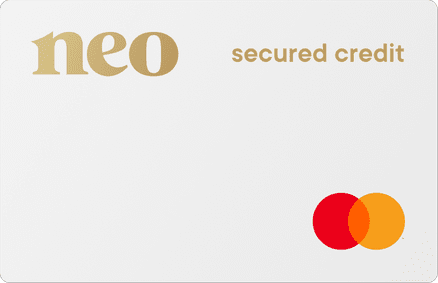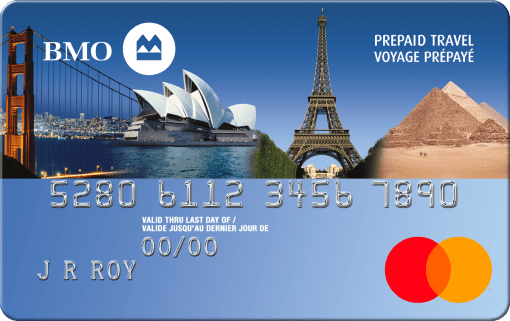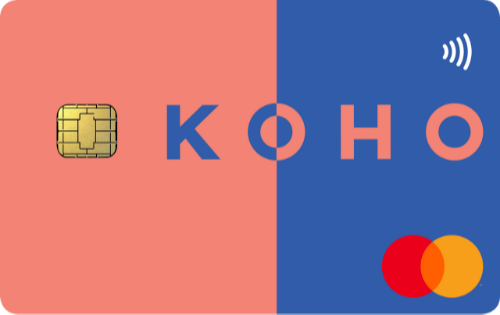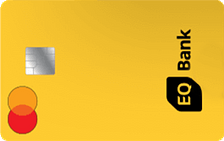Quick overview of the EQ Bank Card
The EQ Bank Card is a no-fee, reloadable, prepaid Mastercard issued by Equitable Bank that offers high interest on your savings and a minimal, straightforward cashback rewards system. Cashback is earned at a rate of 0.5% on every purchase, and you can earn anywhere from 2.5% to 4% interest on your card balance. So, you benefit more from saving than you do from spending.
While offering high-interest savings and cashback rewards, the EQ Bank Card is straightforward to use. It needs to be linked to an EQ Bank personal or joint account, and while it doesn't offer the opportunity to improve your credit score like a standard credit card, it also doesn't come with any added complications. There are no added perks like a welcome offer or emergency travel insurance, but this simplicity allows you to focus on what's important to you. This review covers all angles of the card to help you make an informed decision.
Who’s the EQ Bank Card for?
The EQ Bank Card is designed for adults who want to control their spending, grow their savings and have flexible use of their card, with no hidden fees. It’s an excellent option for those who travel, pay with cash frequently and already have a separate card with a solid rewards or points system.
Pros and cons
Pros
-
Earn up to 3.75% interest on your account balance
-
No monthly fee or ATM fees in Canada
-
No foreign transaction fee
-
No credit or income requirements
Cons
-
Low cash back amount of 0.5%
-
No welcome offer
-
No insurance
-
Won’t build credit history
EQ Bank Card welcome offer
There’s no welcome offer for this card at the moment.
How to earn rewards on the EQ Bank Card
The EQ Bank card has a flat cashback rate of 0.5% on every purchase in-store or online, regardless of which spending category it falls under. While this is easy to track, it doesn’t offer high cashback earning potential.
The cashback you earn is calculated daily and added to your card balance, monthly. But like most reward systems, you won’t get to keep cashback earned on returned purchases.
How to redeem rewards with the EQ Bank Card
Redeeming cash back with the EQ Bank Card is automatic, so you don't have to lift a finger. EQ Bank deposits the amount onto your card before the end of each month for purchases made the month prior. There's no redemption shop to cash in on gift cards or merchandise; there is just straight cash.
EQ Bank Card key benefits
- Earn 2.5% interest on savings until you spend plus an additional 1.5% interest when you set up recurring direct deposit to your Personal Account
- Earn 0.5% cash back on all purchases
- No foreign transaction fees, monthly fees or hidden fees
EQ Bank Card insurance coverage
There are no insurance benefits with this card at the moment.
Extra benefits
- Any ATM fees charged by a third party service provider in Canada are refunded by EQ Bank within 10 days
- Funds on your card are eligible for Canada Deposit Insurance Corporation (CDIC) protection up to $100,000
- The EQ Bank card can be used in more than 210 countries worldwide wherever Mastercard is accepted
- No risk of debt accumulation
- No minimum balance required
EQ Bank Card eligibility criteria
- Must have a permanent Canadian address
- Must be the age of majority in the province or territory where you live
What people have to say about this card
Users have much to say about the EQ Bank Card under the Reddit channel Personal Finance Canada. Some users use this card as a travel card (given the waived foreign transaction fee) but have had issues with the tap function working, which may require a PIN reset. Another user reminds cardholders that locations that only take debit or cash might not accept the card, as it’s not an Interac Debit card. And another plans to keep a balance loaded specifically for taking money out of an ATM to avoid fees.
Those on the EQ Bank Reddit channel highly regard the EQ Bank Card, mainly because it’s a good tool for ATM withdrawals and avoiding fees. Others also use it for daily banking needs, non-fixed expenses and budgeting.
An EQ Bank Card discussion panel on RedFlagDeals also highlights that EQ Bank will only reimburse ATM fees charged in Canada, not from a foreign bank. They point out that, while there has also been a sign-up bonus in the past, there isn’t now.
How the EQ Bank Card compares
EQ Bank Card vs. Neo Secured Credit Card
Neo Secured Credit Card

4.0
$25 on signup
Welcome offerPoor
Suggested credit score$25 customer sign up bonus welcome offer
Pros
-
No annual fee
-
Low minimum security deposit
-
Cash back rewards on purchases
-
Instant approval regardless of credit score
Cons
-
Only reports to TransUnion
-
High APR range
Eligibility
Poor
Recommended Credit Score
$0
Required Annual Personal Income
$0
Required Annual Household Income
Recommended Credit Score
Poor
Required Annual Personal Income
$0
Required Annual Household Income
$0
15%
Up to 15% on first new purchases with Neo partners
5%
With Neo Partners
1%-3%
on gas and groceries
3%-4%
Streaming, ridesharing, and food delivery services
2%-3%
With retail partners
0.5%
On everything else
Up to 15% on first new purchases with Neo partners
15%
With Neo Partners
5%
on gas and groceries
1%-3%
Streaming, ridesharing, and food delivery services
3%-4%
With retail partners
2%-3%
On everything else
0.5%
19.99% - 29.99%
Variable APR
22.99% - 31.99%
Cash Advance APR Plus a $2.50 fee in Canada, $5 fee anywhere else
$0
Annual Fee Option to pay $4.99/month for premium membership to unlock higher cash back rewards
Variable APR
19.99% - 29.99%
Cash Advance APR
22.99% - 31.99%
Annual Fee
$0
Pros
-
No annual fee
-
Low minimum security deposit
-
Cash back rewards on purchases
-
Instant approval regardless of credit score
Cons
-
Only reports to TransUnion
-
High APR range
Eligibility
Poor
Recommended Credit Score
$0
Required Annual Personal Income
$0
Required Annual Household Income
Recommended Credit Score
Poor
Required Annual Personal Income
$0
Required Annual Household Income
$0
15%
Up to 15% on first new purchases with Neo partners
5%
With Neo Partners
1%-3%
on gas and groceries
3%-4%
Streaming, ridesharing, and food delivery services
2%-3%
With retail partners
0.5%
On everything else
Up to 15% on first new purchases with Neo partners
15%
With Neo Partners
5%
on gas and groceries
1%-3%
Streaming, ridesharing, and food delivery services
3%-4%
With retail partners
2%-3%
On everything else
0.5%
19.99% - 29.99%
Variable APR
22.99% - 31.99%
Cash Advance APR Plus a $2.50 fee in Canada, $5 fee anywhere else
$0
Annual Fee Option to pay $4.99/month for premium membership to unlock higher cash back rewards
Variable APR
19.99% - 29.99%
Cash Advance APR
22.99% - 31.99%
Annual Fee
$0
Since the Neo Secured Credit Card is a secured card, not a prepaid card, it can help build or rebuild your credit history, while the EQ Bank Card won’t. There’s more earning potential with the Neo Card, too, as it offers up to 6% cashback, while the EQ Bank Card only offers 0.5%. The Neo Card also allows you to customize and upgrade your rewards (for a monthly fee) to include higher cash-back amounts and added perks. At the same time, the EQ Bank Card is more straightforward and doesn’t offer the option to increase rewards.
However, the Neo card doesn’t offer an opportunity to grow your balance with interest like the EQ Bank Card, which also has the benefit of no foreign transaction fees. If you want to repair or start building your credit history safely, and earn as you spend, the Neo Secured Credit Card is an excellent way to go. But, if your goal is to focus on growing your savings and avoid hidden transaction fees, the EQ Bank Card is more suitable.
EQ Bank Card vs. BMO Prepaid Mastercard
BMO® Prepaid Mastercard®*

3.5
Fair
Suggested credit scoreto receive the latest news, tips and offers by email
Pros
-
No credit check or minimum income requirements for approval.
-
Accepted internationally at over 30 million locations.
-
Offers Purchase Protection and Extended Warranty coverage.
-
No interest rates since it's not a credit card.
-
Enhanced security features, including Mastercard’s Zero Liability insurance.
Cons
-
No rewards or cash back program.
-
Annual fee of $6.95
-
Various fees, including foreign transaction fee and inactivity fee.
-
Maximum balance limit of $10,000
Eligibility
Fair
Recommended Credit Score
$0
Required Annual Personal Income
$0
Required Annual Household Income
Recommended Credit Score
Fair
Required Annual Personal Income
$0
Required Annual Household Income
$0
N/A
There are no rewards with the BMO Prepaid Mastercard
There are no rewards with the BMO Prepaid Mastercard
N/A
0.00%
Purchase APR N/A
$6.95
Annual Fee
2.50%
Foreign Transaction Fee
Purchase APR
0.00%
Annual Fee
$6.95
Foreign Transaction Fee
2.50%
Pros
-
No credit check or minimum income requirements for approval.
-
Accepted internationally at over 30 million locations.
-
Offers Purchase Protection and Extended Warranty coverage.
-
No interest rates since it's not a credit card.
-
Enhanced security features, including Mastercard’s Zero Liability insurance.
Cons
-
No rewards or cash back program.
-
Annual fee of $6.95
-
Various fees, including foreign transaction fee and inactivity fee.
-
Maximum balance limit of $10,000
Eligibility
Fair
Recommended Credit Score
$0
Required Annual Personal Income
$0
Required Annual Household Income
Recommended Credit Score
Fair
Required Annual Personal Income
$0
Required Annual Household Income
$0
N/A
There are no rewards with the BMO Prepaid Mastercard
There are no rewards with the BMO Prepaid Mastercard
N/A
0.00%
Purchase APR N/A
$6.95
Annual Fee
2.50%
Foreign Transaction Fee
Purchase APR
0.00%
Annual Fee
$6.95
Foreign Transaction Fee
2.50%
One of the most significant differences between these cards is the $6.95 annual fee on the BMO Prepaid Mastercard. Though small, any cost can deter someone looking for a prepaid card. Unlike the EQ Bank Card, the BMO card also charges foreign transaction and ATM fees and doesn’t let you gain interest on your card balance when it’s not being spent.
At the same time, the BMO Prepaid Mastercard offers a few perks that the EQ Bank Card doesn’t, including up to 20% savings on National Car Rentals and extended warranty and purchase protection on transactions. The EQ Bank Card ultimately offers flexibility, high interest and no fees, while the BMO Prepaid Mastercard offers a small travel discount and insurance for your purchases.
EQ Bank Card vs. KOHO card
Koho Mastercard

3.9
Poor
Suggested credit scoreto receive the latest news, tips and offers by email
Pros
-
A no-fee account option
-
Earn up to 5% cash back on your purchases
-
Accepted worldwide, wherever Mastercard is accepted
-
Four account tiers, so there’s something for everyone
-
Earn interest on your account
-
RoundUps feature helps you save
-
Financial coaching is available
-
Features like Credit Building (to help you build your credit history) and Cover (to protect you from overdrawing your account)
-
Compatible with Apple Pay
-
Joint account option for families and couples
Cons
-
No physical branches or tellers
-
No RRSP, TFSA or RESP accounts
-
Customer service not on par with the big banks
-
Missing some banking features, like wire transfers, currency exchanges and multiple lines of business like financial planning, mortgages and insurance
Eligibility
Poor
Recommended Credit Score
$0
Required Annual Personal Income
$0
Required Annual Household Income
Recommended Credit Score
Poor
Required Annual Personal Income
$0
Required Annual Household Income
$0
1%
cash back on groceries and transportation
3%
interest earned on your account balance
cash back on groceries and transportation
1%
interest earned on your account balance
3%
0.00%
Purchase APR
0.00%
Cash Advance APR
$0
Annual Fee Option to add credit building (price available in app)
Purchase APR
0.00%
Cash Advance APR
0.00%
Annual Fee
$0
Pros
-
A no-fee account option
-
Earn up to 5% cash back on your purchases
-
Accepted worldwide, wherever Mastercard is accepted
-
Four account tiers, so there’s something for everyone
-
Earn interest on your account
-
RoundUps feature helps you save
-
Financial coaching is available
-
Features like Credit Building (to help you build your credit history) and Cover (to protect you from overdrawing your account)
-
Compatible with Apple Pay
-
Joint account option for families and couples
Cons
-
No physical branches or tellers
-
No RRSP, TFSA or RESP accounts
-
Customer service not on par with the big banks
-
Missing some banking features, like wire transfers, currency exchanges and multiple lines of business like financial planning, mortgages and insurance
Eligibility
Poor
Recommended Credit Score
$0
Required Annual Personal Income
$0
Required Annual Household Income
Recommended Credit Score
Poor
Required Annual Personal Income
$0
Required Annual Household Income
$0
1%
cash back on groceries and transportation
3%
interest earned on your account balance
cash back on groceries and transportation
1%
interest earned on your account balance
3%
0.00%
Purchase APR
0.00%
Cash Advance APR
$0
Annual Fee Option to add credit building (price available in app)
Purchase APR
0.00%
Cash Advance APR
0.00%
Annual Fee
$0
Both prepaid cards provide an incentive to sign up for direct deposit. The EQ Bank Card offers 4% interest on your account balance for doing so, while the KOHO Essential waives its monthly fee. The KOHO card, by default, offers more cash back (up to 5% with the Koho Extra account for $9/month) and more interest on the card balance (5%) than the EQ Bank Card. Plus, KOHO offers the opportunity to build your credit for a fee of $10 per month.
With this in mind, the EQ Bank Card is hassle-free, charges no fees and offers a reasonable interest rate on loaded funds. The EQ Bank Card can accomplish that if you want to grow your savings and skip the fees. If you want to earn a little more as you save and spend and are willing to pay for some added perks, the KOHO card will suit your goals better.
| Features | EQ Bank Card | KOHO Credit Card |
|---|---|---|
| Annual fee | $0 | $48 - $84 or $0 with recurring direct deposit |
| Welcome offer | None | $75 at NBAStore.ca |
| Insurance coverage | None | None |
| Benefits | Up to 3.75% interest on card balance (with recurring direct deposit), no foreign transaction fees, no ATM fees in Canada, no monthly fee, 0.5% cashback | 5% interest on account balance, option to pay for credit building, no monthly fee with direct deposit, up to 5% cash back, in-app savings goals feature |
| Review link | You’re reading it | KOHO Credit Card review |
| More info | Apply now | Apply now |
Both cards can grow your savings. However, the KOHO card suits someone who wants the option to build their credit and struggles to get approved for a traditional credit card. The EQ Bank Card is better for someone who values simplicity and wants to avoid hidden fees.
Is the EQ Bank Card worth it?
The EQ Bank Card’s few core benefits make it a standout in the Canadian market. Not worrying about fees is huge for anyone, especially someone looking for a prepaid card to avoid debt accumulation. EQ Bank’s fee reimbursement feature allows you to explore new places without the dreaded feeling that typically follows a “cash only” sign and a reluctant interaction with an ATM. While other cards offer better cash-back earnings, they provide an excellent opportunity to grow your savings at a high-interest rate. The main downside is that you can’t build or repair your credit. But if that’s not your primary goal, it’s worth considering.

Michelle Bates has seven years of writing experience and has been writing and editing personal finance content since 2021, specializing in credit cards, home and auto insurance and mortgages. She is the former associate editor at WealthRocket and spent close to two years as an editor and writer for rate comparison website RATESDOTCA, where she wrote data-driven reports and edited freelancers’ articles. Her work has been covered by notable Canadian news sources like the Financial Post, The Globe and Mail, CTV News and Narcity.
More secured credit cards in Canada
More secured credit cards in Canada
Disclaimer
The content provided on Money.ca is information to help users become financially literate. It is neither tax nor legal advice, is not intended to be relied upon as a forecast, research or investment advice, and is not a recommendation, offer or solicitation to buy or sell any securities or to adopt any investment strategy. Tax, investment and all other decisions should be made, as appropriate, only with guidance from a qualified professional. We make no representation or warranty of any kind, either express or implied, with respect to the data provided, the timeliness thereof, the results to be obtained by the use thereof or any other matter. Advertisers are not responsible for the content of this site, including any editorials or reviews that may appear on this site. For complete and current information on any advertiser product, please visit their website.






